#John Alderson
Photo
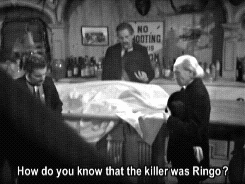
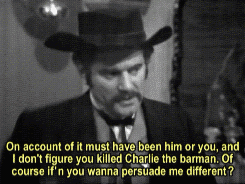




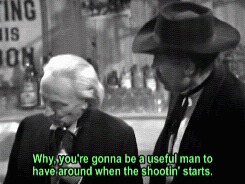
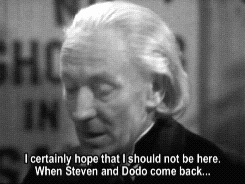


“That was nothing to do with me.”
The Gunfighters - season 03 - 1966
#doctor who#classic doctor who#classic who#first doctor#william hartnell#the gunfighters#marshal wyatt earp#john alderson#bat masterson#richard beale
127 notes
·
View notes
Text
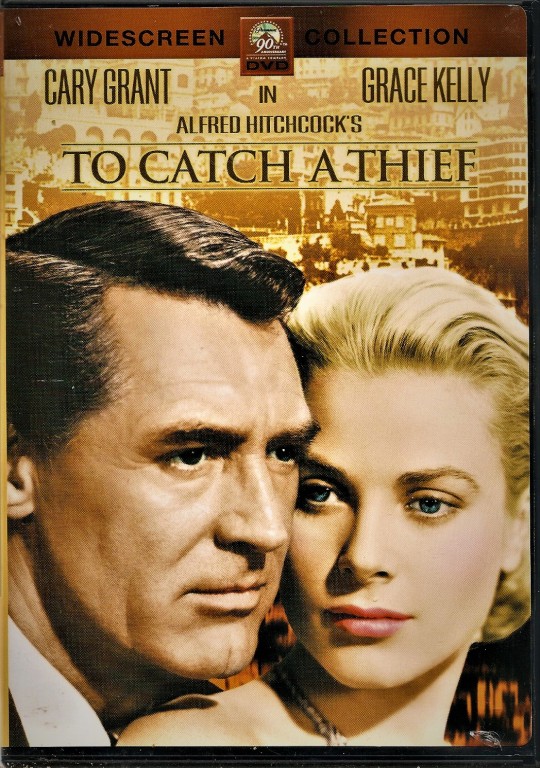
Bad movie I have To Catch a Thief 1955
#To Catch a Thief#Cary Grant#Grace Kelly#Jessie Royce Landis#John Williams#Charles Vanel#Brigitte Auber#Jean Martinelli#Georgette Anys#George Adrian#John Alderson#Martha Bamattre#René Blancard#Eugene Borden#Nina Borget#George Boyce#John Breen#Margaret Brewster#Ralph Brooks#Lewis Charles#Jack Chefe#Frank Chelland#Beulah Christian#Wilson Cornell#Reinie Costello#Paul Cristo#Oliver Cross#William 'Wee Willie' Davis#Dominique Davray#Louise De Carlo
2 notes
·
View notes
Photo

Part two of character sketch requests!
Napoleon Solo (The Man from U.N.C.L.E.) and Carol Danvers (Captain Marvel) for @cha-melodius, Sam Tyler (Life on Mars) for @johnsimms, and Elliot Alderson (Mr. Robot) for @splenderai!
#carol danvers#captain marvel#napoleon solo#henry cavill#brie larson#sam tyler#john simms#elliot alderson#rami malek#sketch requests#my art
68 notes
·
View notes
Text
Me whenever I find the most mentally fucked up, traumatised character in a piece of media

46 notes
·
View notes
Text
John Coltrane Reissue Review: Evenings at the Village Gate: John Coltrane with Eric Dolphy
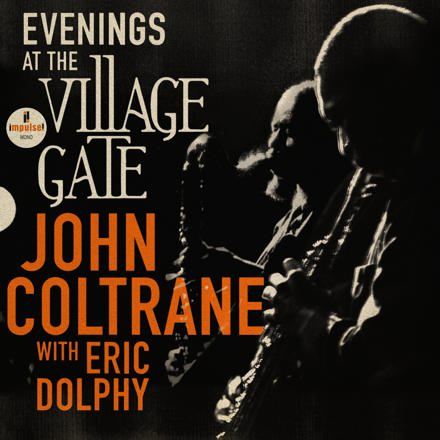
(Impulse!/UMe)
BY JORDAN MAINZER
Not even two years after A Love Supreme: Live in Seattle saw the light from Joe Brazil's private collection, a new John Coltrane treasure has been given to us, unearthed this time by accident. A Bob Dylan archivist, scouring through the archives of the New York Public Library for the Performing Arts, found an August 1961 recording of John Coltrane with Eric Dolphy at Greenwich Village's long-shuttered Village Gate. While Coltrane's November performances from the same year at the Village Vanguard have long been available, either as part of his 1962 live album or a 1997 box set, this collection shows some familiar players a bit rougher around the edges. Future Nina Simone and Dylan engineer Richard Alderson, who wanted to test a newly found single ribbon microphone, decided to record the set, and everything from McCoy Tyner's restrained piano to, well, the overall sound quality, has the vibe of a group of geniuses still figuring things out, a fascinating snapshot in an ever-changing time in jazz.
In an era where our most revered artists take seemingly forever to release new albums, it's hard to fathom just what luminaries like Coltrane did back then, and the rapid pace of change they faced in a burgeoning music industry. In March, he released My Favorite Things on Atlantic, which yielded surprising hits in adaptations of George Gershwin's "Summertime" and Rodgers and Hammerstein's "My Favorite Things", the latter of which received significant radio airplay. Two months later, his Atlantic contract was bought by Impulse! While he kept Tyner and drummer Elvin Jones in his band, he replaced bassist Steve Davis with a young Reggie Workman and brought on multi-instrumentalist Eric Dolphy, forming the basis of a live quintet. His studio ensemble grew even larger on the first album he recorded for Impulse!, Africa/Brass, also one of his first to employ two bass players. Eventually, though, he'd settle into the Classic Quartet, Jimmy Garrison replacing Workman for the next several years, the four producing stone cold classics like, yes, A Love Supreme. It's impossible to separate this context when listening to Evenings at the Village Gate: John Coltrane with Eric Dolphy in all of its rawness.
Really, Evenings at the Village Gate is a true moment in time and one of arguable significance, though listening to it is a fascinating exercise. You constantly find yourself wishing you were there to witness it, watching an audience in real time react to where you know jazz would end up. As Jones' pattering drums and Workman and Tyner's steady bass and piano introduce "My Favorite Things", Dolphy subtly flutters his clarinet. Six minutes in, Coltrane announces himself with a brawny saxophone line before blasting streaks of notes above the band. When he very occasionally returns to the song's main refrain, it's like a sigh of relief before he embarks on another freeform journey. Sometimes, you can hear an audience member clapping, thinking his solo has finished, but he keeps going. Dolphy offers a similarly tattered solo on Benny Carter's "When Lights Are Low", while the rest of the band lurches. Tyner's solo, for example, is sprinkled but so low in the mix you can almost clearly hear background chatter in the club, and you can definitely decipher Workman's plucks. The band is risky and adventurous, unafraid to fail.
The final three tracks performed would eventually be recorded, including "Impressions", a Coltrane composition first set to tape in 1962. The version on Evenings at the Village Gate is an early run-through the way a lot of jazz instrumentalists do today. On one hand, hearing him breathlessly and immediately whittle away at schemas of jazz must have been thrilling. On the other, compared to the live versions of the song from months later, on this one, Coltrane embraces true chaos rather than controlled chaos. Only Jones and Tyner are truly honed in here, the former shining with his dexterousness throughout and underrated dynamism in his be-bop duet with the latter. If you've always thought Coltrane's recording of "Greensleeves", meanwhile, sounds a little bit like "My Favorite Things", Tyner somewhat interpolates the latter song as Jones' drum fills pervade the performance. Tyner's two-handed solo mid-way through simultaneously showcases the song's theme and his own phrasing, while Coltrane and Dolphy enter much later, as if they've been stockpiling on reserves before gradually taking the tune to dizzying new heights.
If there's a true highlight on Evenings at the Village Gate, it's of course the only known recorded version of Africa/Brass' "Africa". Art Davis fills in on additional bass drones, with Coltrane on tenor saxophone, and the song feels like the most the band had been in sync all night. Perhaps that's because there's nothing else to compare it to, but the performance is still thrilling taken on its own, from Jones' raindrop pitter patters to Tyner's unshakeable refrain. Coltrane and Dolphy give way to the rest of the band for a while, and the tune slowly ascends as they tease a return, first giving Jones his due with a rolling solo and then actually returning to rapturous applause, skronking and squeaking away. You have to think that some members of the audience had no conception for what they just saw. You also have to think the set made them want to dive in further.
youtube
#album review#john coltrane#new york public library for the performing arts#Evenings at the Village Gate: John Coltrane with Eric Dolphy#eric dolphy#impulse!#ume#a love supreme: live in seattle#joe brazil#bob dylan#village gate#village vanguard#nina simone#richard alderson#mccoy tyner#my favorite things#george gershwin#atlantic#elvin jones#steve davis#reggie workman#africa/brass#jimmy garrison#a love supreme#benny carter#art davis#richard rodgers#rodgers and hammerstein#oscar hammerstein#evenings at the village gate
1 note
·
View note
Text
4 agosto … ricordiamo …
4 agosto … ricordiamo …
#semprevivineiricordi #nomidaricordare #personaggiimportanti #perfettamentechic
2020: Brent Carver, attore e cantante canadese di origini gallesi e irlandesi. Ha recitato in diversi musical e opere di prosa a Broadway. Carver era noto per una varietà di ruoli teatrali e cinematografici. Carver non si è mai sposato. L’attore è morto all’età di 68 anni e nessuna causa di morte è stata specificata. (n.1951)
2014: Carmen de Lirio, all’anagrafe María del Carmen Forns Aznar,…

View On WordPress
#4 agosto#Barbara Bennett#Bella Starace Sainati#Brent Carver#Carmen de Lirio#Désiré-Paul Parfouru#Diana Bandini Lucchesini Rogliani#Erville Alderson#Felice Musazzi#Franco Castellani#Frank Ross#Jack Pickard#Janette Loff#Jeanette Loff#Jeannette Loff#Jeannette Lov#John M. Pickard#John Pickard#María del Carmen Forns Aznar#Melvyn Douglas#Melvyn Edouard Hesselberg#Michael Charles Gauntlet Wilding#Michael Wilding#Morti 4 agosto#Paul Porel#Victor Mature#Vittorio Maturi
0 notes
Text
John B. Wilkinson of Logan, WV (1928)
Judge John B. Wilkinson of #Logan #WV (1928) #Appalachia #history #lawyers
From West Virginians, published by the West Virginia Biographical Association in 1928, comes this profile of Judge John B. Wilkinson of Logan, WV:
The Honorable John B. Wilkinson, who died August 12, 1919, at Logan, where he had long been a foremost citizen, held rank among the best known and most successful lawyers and jurists in West Virginia. In business likewise Judge Wilkinson enjoyed a…

View On WordPress
#Alderson-Wilkinson Land Company#Appalachia#Ashburn#attorney#Big Huff Coal Company#California#Carroll County#Cincinnati#David Wilkinson#Ernest Eugene Wilkinson#First Baptist Church#genealogy#Guyan Coal Company#Guyan Valley Bank#Guyandotte Valley#history#Hollywood#John B. Wilkinson#John B. Wilkinson Jr.#Knights Templar#lawyer#Logan#Logan County#Margaret Midyette#Mary Belle Straton#Mingo County#Mona Coal Company#Mona Russo#Mystic Shrine#prosecuting attorney
0 notes
Text
Barring any last minute adjustments, here is the list:
Shallan Davar/Veil/Radiant - The Stormlight Archive
Shigeo “Mob” Kageyama - Mob Psycho 100
Yugi Mutou & Atem - Yu-Gi-Oh!
The Moon Knight System (Marc Spector, Steven Grant, Jake Lochley) - Moon Knight Marvel Comics
Frisk/Chara - Undertale
Raphael Hamato - Rise of the Teenage Mutant Ninja Turtles
Greed/Ling - Fullmetal Alchemist
Harrier Du Bois - Disco Elysium
Epsilon - Red vs Blue
Sunny/Omori - OMORI
Arthur Lester / John Doe - Malevolent Podcast
Link (Green, Red, Blue, Vio, and Shadow) - The Legend of Zelda: Four Sword Adventures
Sora/Roxas/Ventus/Vanitas - Kingdom Hearts
ENA - ENA
Uendo Toneido (Uendo & Patches & Kisegawa & Owen) - Ace Attorney: Spirit of Justice
Blitzwing - Transformers: Animated
Dr Alto Clef - SCP wiki
Cassie O'Pia - Psychonauts 2
Bruce Banner/Hulk/Joe Fixit/Devil hulk - Marvel comics
Link/Deku Butler’s Son/Darmani III/Mikau/Fierce Deity - LoZ Legend of Zelda: Majora’s Mask
Hojo Emu, Tensai Gamer M, Parado - Kamen Rider Ex-Aid
The Warrior of Light - Final Fantasy XIV
Yellow Guy - Don’t Hug Me I’m Scared
Madeline & Mirrorline - Celeste
Darcy Wu - Amphibia
Jaden Yuki/Haou Jaden/Yubel - Bodyname Jaden Yuki - Yu-Gi-Oh! GX
Mike/Chester/Vito/Svetlana/Manitoba/Mal - Total Drama
Peter Nureyev - The Penumbra Podcast
Ford Cruller - Psychonauts
Goldia die Heilige/Fleta/Harpae/Lisette - Pocket Mirror
Wildcards - Persona
The Sunken - Oxenfree
Edward Teach - Our Flag Means Death
Jackson Jekyll and Holt Hyde - Monster High
Mikoto Kayano - Milgram
Patrick and Rey Sprigs - Megaman Starforce
The Legion System (David Haller and headmates) - Marvel/X-Men Comics
Triad/Luornu Durgo - LoS Legion of Superheroes Post-Zero Hour run/1993-2003 run
Vyncent “Virion” Sol - Just Roll With It: Prime Defenders
Diavolo and Dopplio - Jojo’s Bizarre Adventure
One-One - Infinity Train
Alluka and Nanika Zoldyck - Hunter x Hunter
Gray Reverse - Helios: Rising Heroes
Raiden Ei/Raiden Shogun - Genshin Impact
Sylvie Ashling and Dr. Beefton - Epithet Erased
Kris and the SOUL - Deltarune
Hajime Hinata/Izuru Kamukura - Super Dangan Ronpa 2
BMO - Adventure Time
Pyra/Mythra/Spoilers - Xenoblade Chronicles 2
Red - Twitch Plays Pokemon
Eda Clawthorne - The Owl House
Aubrey Little - The Adventure Zone: Amnesty
Killer B & Gyuki - Naruto
Dirk Strider - Homestuck
Miyao/Meow Mitake - Ciconia When They Cry
Roronoa Zoro - One Piece
Sho and Minazuki - Persona 4 Arena Ultimax
Jesse Faden - Control
Mollymauk/Kingsley Tealeaf/Lucien Tavelle - Critical Role
Jace - Magic the Gathering
Elliot Alderson - Mr Robot
Webber - Don't Starve
Sawada Tsunayoshi - Katekyo Hitman Reborn
Izuku Midoriya - Boko No Hero Academia
#not polls#This is ordered from most submissions to least.#The next step is gathering pictures for all of them.#Some of these names will be shorted on the polls because character limit.#Also truth be told: we didn't get around to researching all of them because it's a lot.
63 notes
·
View notes
Text

John Coltrane Quintet with Eric Dolphy - Kulttuuritalo, Helsinki, Finland, November 22, 1961
A day after this performance, DownBeat's John Tynan wrote: "At Hollywood’s Renaissance Club recently, I listened to a horrifying demonstration of what appears to be a growing anti-jazz trend exemplified by these foremost proponents [Coltrane and Dolphy] of what is termed avant-garde music. I heard a good rhythm section… go to waste behind the nihilistic exercises of the two horns.… Coltrane and Dolphy seem intent on deliberately destroying [swing].… They seem bent on pursuing an anarchistic course in their music that can but be termed anti-jazz."
Time has proven Tynan 100% right, of course — this stuff sucks! Just kidding ... the team-up of Coltrane and Dolphy is one the high water marks of modern music as we know it. At least in my opinion. The four-disc Village Vanguard collection offers one of the most incredible listening experiences you'll find anywhere in any genre. And amazingly, we're going to get more Coltrane / Dolphy (and Jones and Tyner and Workman) in about a month. The previously unreleased Evenings at the Village Gate: John Coltrane with Eric Dolphy features 80 minutes of music recorded a couple months prior to the Village Vanguard stand. Unreal! You can check out a sample over on NPR now and although the recording was made with a single mic (by future Dylan engineer Richard Alderson), it sounds well-nigh miraculous.
While we wait for the rest, let's enjoy this wondrous 40+ minutes of the Coltrane Quintet in Finland. Compared to the Village Vanguard tapes from just a few weeks before, the performance is relatively smooth — nothing too outward bound like "India" or "Chasin' Another Trane." Coltrane had already tested the European audience's stamina on his final tour with Miles in 1960, so maybe he was hedging his bets slightly. But that's not meant as a criticism. This is spectacular music from start to finish. And if this group is deliberately destroying swing on the long and luminous "My Favorite Things" here ... well, then destroy away, dudes! Dolphy's incredible flute solo here is a total showstopper.
"At home [in California] I used to play, and the birds always used to whistle with me," Dolphy said. "I would stop what I was working on and play with the birds ... Birds have notes in between our notes—you try to imitate something they do and, like, maybe it’s between F and F-sharp, and you’ll have to go up or come down on the pitch. It’s really something! And so, when you get playing, this comes. You try to do some things on it. Indian music has something of the same quality— different scales and quarter tones. I don’t know how you label it, but it’s pretty."
Photo: Herb Snitzer/Impulse! Records
29 notes
·
View notes
Photo



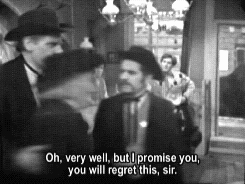
“You’re under arrest, Pop.”
The Gunfighters - season 03 - 1966
#doctor who#classic doctor who#classic who#first doctor#william hartnell#the gunfighters#marshal wyatt earp#john alderson
82 notes
·
View notes
Text
Fandoms / characters I'll write for
TV SHOWS:
American horror story
any ships (includes reader or ships between two characters)
characters (my favs):
- Maddison Montgomery
- Tate Langdon (any Evan Peters char.)
- Michael Langdon/Xavier Plimpton
- Cordelia Fox (Any Sarah Paulson char.)
- Misty Day
- Mallory
- Countess Elizabeth ofc
The walking dead
Characters
- Rick Grimes
- Carl Grimes
- Carol 💥
- Maggie
- Glenn
- Owen (he's hot lmao)
- Negan
-Beth
- Michonne
- Daryl
-Philip Blake (the governor)
The boys
characters
-homelander
-soldier boy
- hugh
-ANY FEMALE CHARACTER
Breaking bad
characters
-Jesse pinkman
- Andrea
- Jane Margolis
MR ROBOT
characters
- Elliot Alderson
- Tyrell 💥
- Johanna
- Darlene
- Dominique
Hannibal
-any characters/pairings
(I know it will be impossible to write smth without gay ships so...I will do it :))
FILMS:
-American psycho
-The hunger games
characters:
- Katniss Everdeen
- Peeta
- Finnick Odair
-Coryo Snow (young ofc)
-Finch (that cute ginger girl from part 1)💥
-Tigriss
- Inglourious Basters
characters
-Hans Landa💥
-Dieter Hellstrom💥
-Bridget
- Shoshanna
-Aldo Raine
-Batman Begins/any other parts
characters:
-Bruse Wayne
-Jonathan Crane 💥
- Miranda Tate
-John Wick
(almost any characters)
Anime
-Jujutsu kaisen
characters:
- Maki Zenin💥
- Mai Zenin
-Nobara Kugisaki
-Gojo
- Nanami Kento
- Riko Amanai💥
- MeiMei
-Tsukumo Yuki💥
-Chosou
-Shingeki no kyojin
characters
- Eren Jaeger
-Floch Forster
- Armin Arlert
- Mikasa Ackerman
- Petra Ral💥
- Hange Zoe💥
- Zeke Yeager
-Pieck Finger
-Anie Leonhart
- Sasha Blouse
-Kumetsu no yaiba
only female characters
AHHH THAT'S A LOOOOT BUT IT'S NOT EVERYTHING
well I would like to add that if you fan of these aktors/aktresses, I'll be writing fanfiction with any of their characters
- Angelina Jolie
- Christian Bale
- Jennifer Lawrence
-Cillian Murphy
- Bill Skarsgard
- Elizabeth Olsen
- August Diehl
- Benedict Samuel
💥- means I find this character hot lmao
#writers block#requests#tv series#anime#anime and manga#breaking bad#the walking dead#american horror story#the boys#mr robot#hannibal#the hunger games#inglourious basterds#batman begins#john wick#jujutsu kaisen#shingeki no kyojin#kimetsu no yaiba#jennifer lawrence#christian bale#cillian murphy#bill skarsgård#elizabeth olsen#august diehl
4 notes
·
View notes
Text
Listening Post: John Coltrane/Eric Dolphy’s Evenings at the Village Gate
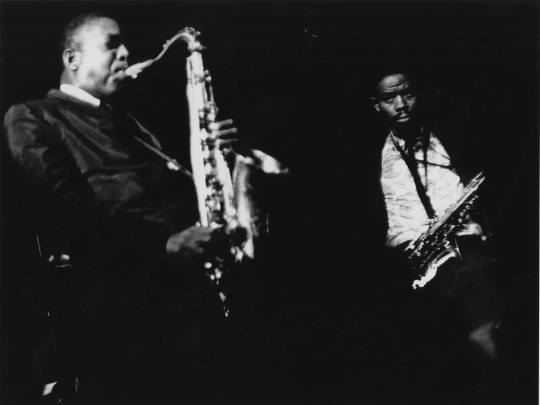
In 1961, John Coltrane was reaching a wider audience via his edited single version of the Sound of Music classic "My Favorite Things.” He was also, although it seems trite to say given the trajectory of his career, in a state of transition. Moving away from his "sheets of sound" period to exploring modality, non-western scales and polyrhythms which allowed him to improvise more deeply within the constraints of more familiar Jazz tropes.
His personal and musical relationship with Eric Dolphy was an important catalyst for the development of his sound. Dolphy was an important presence on Coltrane's other key album from 1961, Africa/Brass and here officially joins the quartet on alto, bass clarinet and flute. Evenings at the Village Gate was recorded towards the end of a month-long residency with a core band of Coltrane, Dolphy, Jones, McCoy Tyner on piano and Reggie Workman on bass. The other musician featured here, on "Africa,” is bassist Art Davis.
The recording captures the band moving towards the more incandescent sound that made Live at the Village Vanguard, recorded just a few weeks later in November 1961, such a viscerally thrilling album. The hit "My Favorite Things" and traditional English folk tune "Greensleeves" are extended into long trance-like vamps. Benny Carter's 1936 classic "When Lights Are Low" showcases Dolphy's bass clarinet and in the originals "Impressions" and particularly "Africa" the quintet hit almost ecstatic grooves. Dolphy's solos push Coltrane further into the spiritual free jazz that so divided later audiences. Dolphy's flute on "My Favorite Things" and especially his clarinet on "When Lights Are Low" are extraordinary, particularly the clarity of his upper register.
The highlight for me is the 22 minute version of "Africa" that closes the set. The two basses, bowed and plucked, Tyner's chordal work and solo, the slow build from the bass solo where the music seems to meander before Jones' explosive solo heralds the return of Dolphy and Coltrane improvising together on the theme, spiralling up the register, contrasting Coltrane's long slurries with Dolphy's staccato bursts which lead to the thunderous conclusion.
As an archivist, sudden discoveries in forgotten basement boxes never surprises and the excitement never gets old. The tapes of Evenings at the Village Gate were recently unearthed in the NY Public Library sound archive after having been lost, found and lost again. Recorded by the Village Gate's sound engineer Rich Alderson these tapes were not meant for commercial use but rather to test the room's sound and a new ribbon microphone. As Alderson says in his notes, this was the only time he made a live recording with a single mic and, yes, there have been grumblings from fans and critics about the sound quality and mix particularly the dominance of Elvin Jones' drums. For me, one the best things about this is that you hear how integral Jones is not just as a fulcrum for the other soloists but as an inventive polyrhythmic presence, playing within and around his bandmates. I know that many of the Dusted crew are Coltrane fans and would love to hear your takes on the music and whether the single mic recording affects your enjoyment in any way.
Andrew Forell
youtube
Justin Cober-Lake: There's so much to get into here, but I'll respond to your most direct question. The single-mic recording doesn't affect my enjoyment at all. I understand (sort of) the complaints, but I think they overstate the problem. More to the point, when I hear an archival release, I really want to get something new out of it. That doesn't mean I want a bad recording, but there's not too much point in digging up yet-another-nearly-the-same show (and I have nearly unlimited patience for Coltrane releases) or outtakes that give the cuts the same basic idea but just don't do it as well. I was really looking forward to hearing Coltrane and Dolphy interact, and nothing here disappoints. Having Jones so dominant just means I get to hear and think more about the role he plays in this combo. It would sound better to have the other instruments a little more to the fore, but it's not a problem (and actually Tyner's the one I wish I could hear a little better).
I think your topic suggests ideas about what these sorts of recordings — when made publicly available — are for. Is it academic material (the way we might look at a writer's journals or correspondence)? Is it to get truly new and good music out there? Is it a commercial ploy? Is it a time capsule to get us in the moment? The best curating does at least three of those with the commercial aspect a hoped-for benefit. This one probably hits all four, but I suspect the recording pushes it a little more toward that first category.
Bill Meyer: I’m playing this for the first time as I type, and I’m only to track three, so my (ahem) impressions could not be fresher.
First, I’ll say that, like Justin, I have a lot of time for Coltrane, and especially the quartet/quintet music from the Impulse years. The band’s on point, it sounds like Dolphy is sparking Coltrane, and Jones is firing up the whole band. Tyner’s low in the mix and Workman’s more felt than heard; the recording probably reflects what it was like to actually hear this band most nights, i.e. Jones and the horn(s) were overwhelming.
How essential is it? If you’re a deep student of Coltrane, there are no inessential records, and the chance to hear him with Dolphy, fairly early on, should not be passed up. But if you’re big fan, not a scholar, then you need to get The Complete 1961 Village Vanguard Recordings box and the 7-CD set, Live Trane: The European Tours, before you drop a penny on this album. And if you’re just curious, start with Impressions. This group is hardly under-documented. The sound quality, while tolerable, is compromised enough to make Evenings At The Village Gate less essential than everything I just mentioned.
I’m only just now starting to play “Africa,” so I’ll check in again after I play that.
“Africa” might be the best reason for a merely curious listener to get this album. It’s very exploratory, the bass conversation is almost casual (not a phrase I use much when discussing Coltrane), and they manage to tap into the piece’s inherent grandeur by the end.
“Africa” is a great example of this band working out what they’re doing while they’re doing it.
Andrew Forell: On Justin’s points about the function of archival releases, I’ve been going back and forth on the academic versus time capsule/good music uncovered question. There is a degree of cynicism and skepticism in these days of multidisc, anniversary box sets in arrays of tastefully colored vinyl which seemed designed for the super(liquid)fan and cater to a mix of nostalgia and fetish. Having said that specialist archival labels have done us a great service unearthing so much "lost" and under-represented music. On one hand I agree with your summation and to Bill’s point, yes this quintet has been pretty thoroughly documented and yes the Vanguard tapes would be the place to start. But purely as a fan I am more interested in live recordings than discs of out- and alternative takes. I’m thinking for example of the 1957 Monk/Coltrane at Carnegie Hall and Dolphy’s 1963 Illinois concert especially his solo rendition of “God Bless the Child," recordings that sat in archives for 48 and 36 years respectively.
youtube
By contrast, the other recent Coltrane excavation, Both Directions at Once is wonderful but I’m not listening to it as an academic exercise, taking notes and mulling over the different takes, interesting as they are. I approach Evenings as another opportunity to hear two great musicians, in a live setting, early on in their short partnership. As Justin says, this aspect doesn’t disappoint. I agree with Bill that the mix is close to what you would you hear in the room, the drums and horns to the fore. All this is a long way to a short answer. A moment in time, a band we’ll never experience in person and when all is said and done, 80 minutes of music I’d otherwise not hear.
Jonathan Shaw: As a relative newb to this music, I can't contribute cogently to discussions of this set's relative value. Most of the Coltrane I've listened to closely is from very late in his life, when he was playing wild and free--big fan of the set from Temple University in 1966 and the Live at the Village Vanguard Again! record from the same year. None of that is music I understand, but I feel it and respond to it strongly. The only Dolphy I've listened to closely is Out There. So I'll be the naif here.
I need to listen to these songs another few times before I can say anything about them as songs, but I really love the right-there-ness of the sound. I like being pushed around by the drums and squeezed between the horns (the first few minutes of "Greensleeves" are delightful in that respect). Maybe I'm lucky to come to the music with so little context. It's a thrill to hear the playing of these folks, about whom there is so much talk of collective genius. Perhaps because my ears are so raw to these sounds, I feel like that talk is being fleshed out for me.
Jim Marks: I think that this release has both academic and aesthetic (if that’s the right word) significance for Dolphy’s presence alone. I am more familiar with the original releases than the various re-releases from the period, but it’s my impression that there just isn’t that much Dolphy and Trane out there; for instance, I think Dolphy appears on just one cut of the Village Vanguard recordings (again, at least the original release). In particular, I’ve heard and loved various versions of “Favorite Things,” but this one seems unique for the six-plus-minute flute solo that opens the track. The solo is both brilliant in itself and creates a thrilling contrast with Coltrane when he comes in. This track alone is worth the price of admission for me.
Marc Medwin: I agree concerning Dolphy's importance to these performances, and while there is indeed plenty of Coltrane and Dolphy floating around (he took part in the Africa/Brass sessions that gave us both Africa and a big band version of "Greensleeves") his playing is really edgy here. Bill is right to point toward the sparks Dolphy's playing showers on the music. Yes, the flute on "My Favorite Things" is really stunning. He's all over the instrument, even more so than in those solos I've heard from the group's time in Europe.
Jon, I'd suggest that there's a strong link between the albums you mention and the Village Gate recordings we're discussing, a kind of continuum into which you're tapping when you describe the excitement generated by the playing. The musicians were as excited at the time as we are on hearing it all now! It was all new territory, the descriptors were in the process of forming, and while Cecil Taylor, Ornette Coleman, Sun Ra and a small group of kindred spirits were already exploring the spaceways, they were marginalized. That may be a component of the case today, but it's tempered by a veneration unimaginable at the time. That's part of the reason Dolphy lived in apartments where the snow came through the walls. Coltrane had plenty to lose by alienating the critics, but ultimately, it did not stop his progress. These recordings mark an early stage of that halting but inexorable voyage. With the possible exception of OM, Coltrane's final work never abandoned the tonal and modal extremes at which he was grabbing in the spring and summer of 1961.
Jennifer Kelly: Like Jon, I'm not well enough versed in this stuff to put it context or even really offer an opinion. I'm enjoying it a lot, and I, also, like the roughness and liveness of the mix with the foregrounded drums. But I think mostly what I am drawn to is the idea that this show happened in 1961, the year I was born, and that these sounds were lost for decades, and now you can hear them again, not just the music but the room tone, the people applauding, the shuffling of feet etc. from people who are almost all probably dead now. It seems incredibly moving, and I am also taken by the part that the library took in this, in conserving this stuff and forgetting it had it and then rediscovering it. In this age of online everything-available-all-the-time, that seems remarkable to me, and proves that libraries are so crucial to civilization now and always, even as they're under threat.
Marc Medwin: A real time machine, isn't it? We are fortunate that we have these documents at all, and yes, the story of the tapes resurfacing is a compelling one! To your observations, audience reaction seems pretty enthusiastic to music that would eventually be dubbed anti-jazz by prominent members of the critical establishment!
Bill Meyer: I can imagine this music being more sympathetically received by audiences experiencing its intensity, whereas critics might have fretted because it represented a paradigm shift away from bebop models, so they had to decide if it was jazz or not.
It is amusing, given the knowledge we have of what Coltrane would be playing in five years, that this music is where a lot of critics drew a line in the sane and said, "this is antijazz."
Jon Shaw: Yes, Bill, that seems bonkers to me. I am particularly moved by the minutes in that 1966 set at Temple when Coltrane abandons his horn altogether and starts beating his chest and humming and grunting. Wonder what the chin-stroking jazz authorities made of that.
Given my points of reference, this set sounds so much more musically conventional. But the emotional force of the music is still immediate, viscerally present. Beautifully so.
youtube
Andrew Forell: In retrospect, all those arguments seem kind of crazy. Yesterday’s heresies become tomorrow’s orthodoxies but what we’re left with is, as Jonathan says, the visceral beauty of Coltrane’s striving for transcendence and his interplay with Dolphy’s extraordinary talent which we hear here working as a catalyst for Coltrane. As Marc and Jen note the audience is there with them..
Come Shepp, Sanders & Rashid Ali, the inquisitors’ fulminations only increased and you think what weren’t you hearing?
Marc Medwin: I was just listening to a Jaimie Branch interview where she's talking about her visual art, about throwing down a lot of material and finding the forms within it. I think that might be another throughline in Coltrane's and certainly Dolphy's work, a gradual discarding of traditional forms and poossibly structures based on what I hate to call intuition, because it diminishes the process.
Then, I was thinking again about our discussion of the critics. I see their role, or their assessment of that role, as a kind of investment without reward, and yeah, it does seem bonkers now! Bill Dixon once talked about how the writers might spend considerable time and expend commensurate energy learning to pick out "I Got Rhythm" on the piano, and they're suddenly confronted with... well, the sounds we're discussing! What would you do, or have done, in that situation? It's really easy for me, like shooting fish in the proverbial barrel, to
disparage critical efforts of the time, especially in light of the ideas and philosophies Branch and so many others are at liberty and encouraged to play and express now, but I wonder how I would have
reacted, what my biases and predilections would have involved at that pivotal moment.
Ian Mathers: The points about historical reception are really interesting, I think. There's a famous (in Canada!) bunch of Canadian painters called the Group of Seven, hugely influential on Canadian art in the 20th century and still well known today. In all the major museums, reproductions everywhere, etc. They were largely landscape painters, and while I think most of the work is beautiful, it's so culturally prominent that it runs the risk of seeming boring or staid. I literally grew up with it being around! So it was a delightful shock to read a group biography of them (Ross King's Defiant Spirits: The Modernist Revolution of the Group of Seven, if anyone is hankering for some CanCon) and see from contemporary reviews that people were so shocked and appalled by the vividness of their colour palettes and other aesthetic choices that they were practically called anti-art at the time. It's not surprising to me that this music would both attract similar furore at the time and, from the vantage point of a new listener in 2022 who loves A Love Supreme and some of the other obvious works but hasn't delved particularly far into Dolphy, Coltrane live, or this era in jazz in general (that would be me), be heard and felt as great, exciting, but not exactly formally radical stuff.
I don't think I would have noticed much about the recording quality were people not talking about it. "My Favorite Things" seems to have the overall volume down a bit, but still seemed pretty clear to me (agree with the assessments above; Coltrane, Dolphy, and Jones very forward, others further back although even when less prominent I find myself 'following' Tyner's work through these tracks more often than not), and starting with "When Lights Are Low" that seems to be corrected. It actually sounds pretty great to me! Although I absolutely defer to Bill's recommendations for better starting places for serious investigations, I can also say as a casual but interested fan who tends to quail in the face of box sets and other similarly lengthy efforts this feels from my relatively ignorant vantage like a perfectly nice place to start. I like Justin's rubric for why these releases might come about (or be valuable), but if I hadn't heard any Coltrane and you just gave me this one, my unnuanced perspective would just be something like "wow, this is great!" But maybe I'm underthinking it. And having that reaction doesn't mean that others aren't right to recommend better/more edifying entry points, or that having that reaction shouldn't lead one to educate oneself.
Jonathan Shaw: Maybe it's a lucky thing for me to be so poorly versed in Coltrane's music, not just in the sense of having listened to precious little of it. I am even less familiar with the catalog of music criticism, which in jazz seems to me voluminous, archival in scale. But even with music I'm extensively engaged with — historically, critically — I try to understand it and also to feel it. I can't imagine not feeling what's exciting in this music, energizing and challenging in equal measure.
Like Marc, I don't want to recursively impugn the critical writing of folks working in very different contexts. But I don't like it when the thinking gets in the way of the music's emotional and aesthetic force, which to me feels unmistakably powerful here.
Ian Mathers: Yeah, maybe that's a good distinction to draw; I can imagine in a different time and place feeling like the music here is more radical or challenging than it sounds to us now. But I can't quite imagine not getting a visceral thrill out of it.
Marc Medwin: And doesn't this contradiction get at the essence of what we're trying to do? Those of us who've chosen to write about music are absolutely stuck grasping at the ephemeral in whatever way we're able! How do we balance the ordering of considerations and explanations in unfolding sentences with the spontaneity of action and reaction that made us pick up a pen in the first place?! We add and subtract layers of whatever that alchemical intersection of meaning and energy involves that hits so hard and compels us to write! In fact, the more time I'm spending with these snapshots of summer 1961, the more I decamp from my own philosophizing about critical relativity to sit beside Ian. The stuff is powerful and original, and the fact that so much of what we're hearing now is a direct result of those modal explorations and harmonically inventive interventions says that the dissenting voices were fundamentally, if understandably, wrong! It could be that the musician can be inclusive in a way the writer simply can't.
I'm listening to "Africa" again, which is for me the disc's biggest single revelation in that it's the only concert version we have, so far as I know. How exciting is that Jones solo, and how much does it say about his art and the group's collective art?!! He starts out in this kind
of "Latin" groove with layers of swing and syncopation over it, he
goes into a melodic/motivic thing like you'd eventually hear Ginger
Baker doing on Toad, and then eases back into the groove, all (if no
editing has occured) in about two minutes. He's got the music's
history summed up in the time it would take somebody to get through a proper hello!! Took me longer to scribble about it than for him to play it!!
Justin Cober-Lake: I'm not sure if Marc is making me want to put down or pick up a pen, but he's definitely making me want to listen to "Africa" again. (Not that I needed much encouragement.)
Andrew Forell: Africa/Brass was the first jazz album I bought. Coming from post-punk, I found it immediately the most exciting and challenging music I’d heard and it set me off on my exploration of Coltrane, Dolphy, Coleman and their contemporaries. This version of “Africa” is a highlight for me also for all the reasons Marc, Ian and Jon have talked about.
Bill Meyer: Yeah, "Africa" is quite the jam!
A thought about critical perspective — our discussion has gotten me thinking, not for the first time, about the impacts of measures upon experience, and the limits of critical thinking when I’m also an avid listener. If I’m listening for “the best” Coltrane/Dolphy, in terms of sound quality or most focused performances, this album isn’t it. But if I’m looking for excitement, this album has loads of it, and that might be enhanced by the drums-forward mix.
#listening post#dusted magazine#john coltrane#eric dolphy evenings at the village gate#jazz#reissuemmc#mccoy tyner#reggie workman#derek taylor#art davis#new york public library#andrew forell#justin cober-lake#bill meyer#africa#jonathan shaw#jim marks#mark medwin#jennifer kelly#ian mathers#Youtube
14 notes
·
View notes
Text
starer call for the event! capping at 3 per muse getting started. 3 requests per mun !
alcina dimitrescu (ethan winters)
beth washington (josh washington)
bucky barnes (elliot alderson)
calcifer
david kostyk
eleanor crain
elsa arrendelle
enzo st john (jessica riley, katherine pierce)
godric gryffindor (francesca slytherin, sylvie slytherin)
harry potter (cedric diggory, cho chang)
hayley marshall (hope mikaelson, dream, klaus mikaelson)
heron lyptus
jacen solo (tenel ka djo)
jasmine
jasper hale (benjamin, alice cullen)
kasil monsula
kate bishop (peter parker)
kiara carrera
leo fitz
lilo pelekai (kevin, stitch)
louise belcher (abigail blyg)
malyen oretsev
mia winters
mouse honrada
nora reid (craig manning)
padme amidala (qui gon jinn)
penelope park (josie saltzman)
pietro maximoff (peggy carter)
piper halliwell
rachel green
riley biers
roxanne weasley
samara palpatine (shego)
sarah miller (laudna)
stu macher (randy meeks, billy loomis)
taissa turner (lottie matthews)
tara carpenter (amber freeman, chad meeks martin)
15 notes
·
View notes
Text
Whumptober 2022 Masterpost

Thank you all for this amazing month 🖤
Day 01: A little out of the ordinary
This wasn't supposed to happen: Batwoman 1x15 (Kate Kane) + Travelers 1x09 (Grant MacLarren)
Day 02: Nowhere to run
Caged: Doctor Who 13x01 (Dan Lewis) + Seventh Son (Kit Harington)
Day 03: Hair’s breadth from death
Gun to temple: Bodyguard 04 (David Budd) + Gran Hotel 2x21 ( Julio Olmedo)
Day 04: Dead on your feet
Waking up disoriented: Mononoke Hime (Ashitaka) + The Defenders 07 (Matt Murdock)
Day 05: Every whumpee’s needs
Running out of air: White Collar 1x08 (Neal Caffrey)
Day 06: Proof of life
Ramson video: Chicago PD 3x01 (Jay Halstead)
Day 07: The way you shake and shiver
Seizures: Kyle XY 1x09 (Matt Dallas)
Day 08: Everything hurts and I’m dying
Stomach pain: Guardian 08 (Zhao Yun Lan)
Day 09: The very noisy night
Caught in a storm: When the devil calls your name 16 (Ha Rip) + X-men Evolution 2x06 (Scott and Alex Summers)
Day 10: Poor unfortunate souls
Waterboarding: Salvation 1x04 (Darius Tanz)
Whipping: Thieves of the wood 1x07 (Jan de Lichte) + The Terror 1x04 (Cornelius Hickey)
Day 11: "911, what's your emergency?"
Makeshift splint: Hawaii 5-0 1x20 (Steve McGarrett) + The Untamed 13 (Lan Wang Ji)
Day 12: What could go wrong
Cave in: Descendants of the sun 08 (Yoo Shi Jin)
Day 13: Can’t make an omelette without breaking a few legs
Dislocation: Burn Notice 3x01 (Michael Westen) + Gundam Wing 03 ( Yuy Heero)
Day 14: Die a hero or live long enough to became a villain
"I'll be right behind you": Pirates of the Caribbean At World's End (James Norrington)
Day 15: Emotional damage
New scars: Rurouni Kenshin The Beginning (Himura Kenshin)
Lies: The Outpost 2x04 (Garret Spears)
Day 16: No way out
Mind control: Fushigi Yuugi 1x20 (Tamahome)
Paralytic drugs: Lost 3x14 (Rodrigo Santoro)
Day 17: Hanging by a threat
Breaking point: Fullmetal Alchemist Brotherhood 19 (Riza Hawkeye)
Day 18: Let's break the ice
"Take my coat": My Amazing Boyfriend 1x18 (Xue Ling Qiao)
Day 19: Enough is enough
Repeatedly passing out: The Untamed (Wei Wu Xian)
Day 20: It's been a long day
Fetal position: Buffy the Vampira Slayer 4x19 (Oz Osbourne) + Mr Robot 1x01 (Elliot Alderson)
Day 21: Famous last words
Coughing up blood: The Resident 5x02 (Devon Pravesh) + The Vampire Diaries 2x21 (Damon Salvatores)
Day 22: Pick your poison
Allergic reaction: Bridgerton 2x03 (Edmund Bridgerton)
Day 23: At the end of their rope
Tied to a table: Alex Rider 1x06 (Alex Rider)
Day 24: Fight, flight or freeze
Blood covered hands: Under the Banner of Heavens 1x07 (Jeb Pyre) + White Lines 1x09 (Oriol Calafat)
Day 25: Silence is gold
Duct tape: The Rookie 2x16 (John Nolan)
Day 26: No one left behind
"Why did you save me?": Downton Abbey 3x10 (Thomas Barrow)
Day 27: Pushed to the limit
Magical exhaustion: Legends of Tomorrow 4x04 (John Constantine) + Rokudenashi Majutsu 03 (Glenn Radars)
Day 28: It's just the tip of the iceberg
Punching the wall: Doctor Who 9x11 (Peter Capaldi)
Day 29: What doesn't kill me
Sleep deprivation: Carnivàle 1x09 (Ben Hawkins)
Day 30: Note to self: don't get kidnapped
Hair grabbing: Ghost Whisperer 1x14 (Melinda Gordon)
Day 31: A light at the end of the tunnel
Bedside vigil: Our flag means death 1x04 (Stede Bonnet)
35 notes
·
View notes
Text
4 agosto … ricordiamo …
4 agosto … ricordiamo …
#semprevivineiricordi #nomidaricordare #personaggiimportanti #perfettamentechic
2006: Diana Bandini Lucchesini Rogliani, è stata compagna di vita dell’attore Totò dal 1931 e sua moglie dal 1935 al 1939. Diana restò in buoni rapporti con Totò – che si sarebbe stabilmente unito dal 1952 all’attrice Franca Faldini – fino alla morte di quest’ultimo. (n. 1915)
1999: Victor Mature, nato Vittorio Maturi, attore statunitense. Fu molto popolare dagli anni quaranta e negli anni…

View On WordPress
#4 agosto#Barbara Bennett#Bella Starace Sainati#Diana Bandini Lucchesini Rogliani#Erville Alderson#Felice Musazzi#Franco Castellani#Frank Ross#Jack Pickard#Janette Loff#Jeanette Loff#Jeannette Loff#Jeannette Lov#John M. Pickard#John Pickard#Melvyn Douglas#Melvyn Edouard Hesselberg#Michael Charles Gauntlet Wilding#Michael Wilding#Morti 4 agosto#Victor Mature#Vittorio Maturi
0 notes
Text
⭐️ OCs as other characters ⭐️
Thank you for the tag @ghostoffuturespast it was very interesting to do the quiz and think about how it sometimes fits so well.
Rules: take this quiz and share 5 (or more! or less! the world is your oyster!) results from the top 50 that you feel really fit your oc(s). if you don’t recognize very many from the top 50, feel free to expand into the top 100
A confession about myself first:
I don't watch TV frequently, I don't go to the movies, I have Netflix and Prime Video, but it is my better half that watches. So, this means that those peeps are probably either from movies/shows that are already old or from a movie someone (mildly) forced me to watch. 😅
Edit: As it turned out, Lucifer and Mr. Robot were two shows I really enjoyed watching, that aren't that old.
1. Valaire
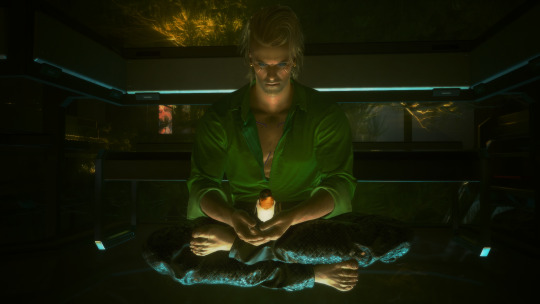
Simon Tam (Firefly + Serenity): 86% (I don't know who that is but I added him because it was the best match.
Obi-Wan Kenobi (Star Wars: Revenge of the Sith): 84%
Dr. John Watson (Sherlock): 83%
Dr. Eric Foreman (House, M.D.): 82%
Morpheus (The Matrix): 81%
2. Joris
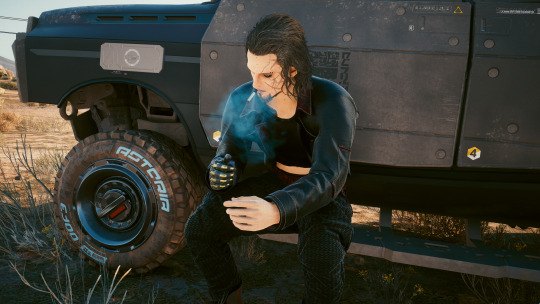
Jack Hodgins (Bones): 86%
Elliot Alderson (Mr. Robot): 79%
L (Death Note): 79%
John Connor (Terminator 2: Judgement Day): 78%
Neo (The Matrix): 76%
3. Vicco
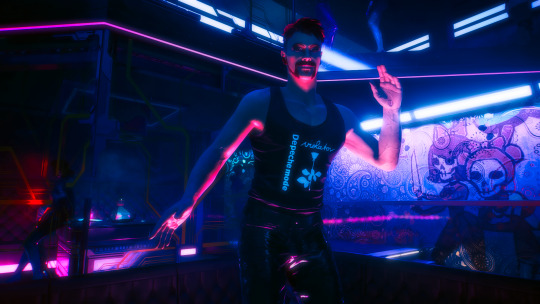
Spike Spiegel (Cowboy Bebop): 89%
Faye Valentine (Cowboy Bebop): 88%
Mazikeen (Lucifer): 87%
Johnny Castle (Dirty Dancing): 86%
Lucifer Morningstar (Lucifer): 85%
4. Myself
Because of the fun (you don't have to do it yourself)
Fox Mulder (The X-Files): 80% (it was the best match, although only 80%)
David Levinson (Independence Day): 80%
Edward Elric (Fullmetal Alchemist: Brotherhood): 75%
Will Hunting (Good Will Hunting): 74%
Neo (The Matrix): 72%
What did I find out about my ocs? Not much new things actually.
Valaire was supposed to be a guide or leader type of person, smart and always knowing what to do. And just maybe he got some treats from Johnny that he adopted.
Joris is the smart tech guy that will find solutions for every problem, even if he has to go some unconventional ways.
Vicco is my chaos child as I call him sometimes, he is charming and someone you would like being around. But only as long as you don't make him mad, because then he can turn into a demon.
As for myself I laughed hard at the first 2 entries because it gave me the "I told you so" vibe. Which happens often when I give advise to others. Unfortunately I am not a good advisor for myself.
I'm tagging with no pressure as always:
@genocidalfetus | @neonbutchery | @wanderingaldecaldo | @cinnamon-mey | @jaymber | @gloryride | @honourandsteel | @vox-monstera
If I didn't tag you and you want to do this, please feel tagged.
Always feel free to tag me on such things, I love to do tagging games.
9 notes
·
View notes